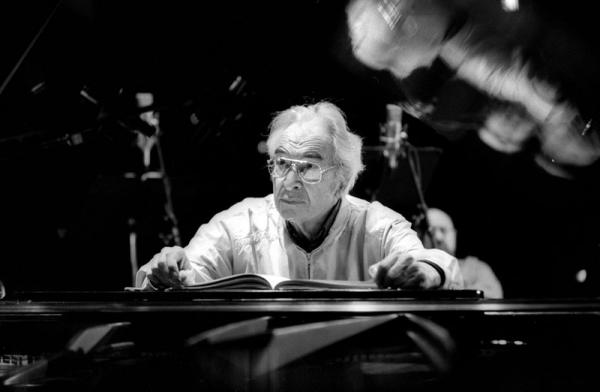Dave Brubeck’s The Gates of Justice Turns 50

October 16, 2019
This week marks the 50th anniversary of the premiere performance of Dave Brubeck’s The Gates of Justice, a civil rights era cantata emphasizing the spiritual and historical parallels of Jewish and African Americans. In acknowledgement, we have added several new Brubeck videos to our website (see below), along with an expanded photo gallery and other resources concerning the work’s history.

Cover art (from left: front and back) from the 1969 recording of The Gates of Justice.
The Gates of Justice origins date to 1968, when Brubeck was approached by the Union of American Hebrew Congregations to help provide a musical solution to a social problem. The UAHC, led by Rabbi Charles H. Mintz, was concerned about a growing divide between the Jewish and African American communities in the waning years of the civil rights movement. Though the two groups had frequently demonstrated and fought together, their relations in the wake of Dr. Martin Luther King Jr.’s assassination had become strained, sometimes to the point of violence. Mintz and Brubeck first met through the Cincinnati Ecumenical Council, which had sponsored a concert of Brubeck’s oratorio, The Light in the Wilderness, earlier that same year. Mintz attended the performance and perceived an opportunity for Brubeck to compose a piece of music that could help bring the Jewish and African American communities back together.
Brubeck was hesitant at first. After all, he was neither Black nor Jewish, and why wade willingly into such potentially volatile waters? But as a child raised in a Protestant-oriented but religiously liberal household (he later became a Roman Catholic), Brubeck was well versed in the Bible’s teachings on peace and social justice. Moreover, after crucial experiences with war and segregation, he had come to understand such teachings as more than mere lessons. They were imperatives, forming a significant part of his moral core.
With Mintz’s willingness to ensure the work’s Judaic appropriateness, Brubeck accepted the commission and delivered a fifty-minute cantata based on biblical verses, Judaic teachings, and excerpts from speeches by Dr. Martin Luther King, Jr. He titled the work The Gates of Justice, after a text from Psalm 118 that appears multiple times throughout the work. Compiling and writing the text fell largely to his wife and frequent artistic collaborator, Iola Brubeck.
In juxtaposing cantorial and spiritual singing styles, Brubeck attempted to draw a line connecting ancient and modern—between the biblical prophet, Isaiah, and the modern prophet, King. “Just as Isaiah drew a blueprint of how to build a society that would allow man to fulfill his dream,” Brubeck wrote in the notes to the 1969 recording, “so Martin Luther King dramatized to the white conscience that it must erase injustice to redeem its own soul.”

From left: Dave Brubeck with Erich Kunzel and Duke Ellington. (Credit: Brubeck Collection, Holt-Atherton Special Collections, University of the Pacific Library. ©Dave Brubeck)
The Gates of Justice’s first performance was a ritual one, dedicating the new building of Cincinnati’s Rockdale Temple on October 17, 1969. The second performance occurred at the meeting of the Union of American Hebrew Congregations in Miami, Florida on October 27th. A recording was organized quickly and an LP featuring Cantor Harold Orbach and baritone McHenry Boatwright was released by Decca Records before the year’s end. A recently discovered photograph posted online by the Holt-Atherton Library reveals that the session was attended by Duke Ellington, though it remains unclear what his role in the recording might have been. With that recording long out of print, the Milken Archive’s 2004 release remains the only complete commercially available recording in circulation.
Though it was composed for a specific occasion and purpose, The Gates of Justice became one of Brubeck’s most frequently performed large scale works. It remains one of the great musical works to have grown out of the civil rights era and continues to be performed regularly.
More on The Gates of Justice
New Videos: Dave and Iola Brubeck on Racism, Gates's Legacy, and Darius Milhaud
Dave Brubeck: Confronting Campus Racism
In one of several new videos available this week, Brubeck relates how he coped with university administrations that did not want a mixed race band performing on their campuses. Watch them all through the links below:
Seeing Slavery's Scar Milhaud's View on Jazz Iola Brubeck: The Performer's Experience
Experience the Music
Short documentary on Dave Brubeck's The Gates of Justice.
Learn more about The Gates of Justice with a short documentary, a complete two-hour oral history, sample clips, and streaming options through the links below.
Explore The Gates of Justice Dave and Iola Brubeck: Complete Oral History Listen on Spotify Listen on Apple Music
